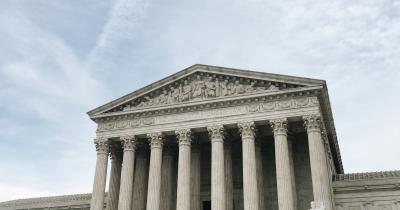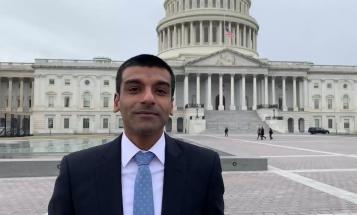
5 Ways the Supreme Court Was Wrong in Buckley v Valeo
Buckley has been called the “original sin” of campaign finance law.

After the Watergate scandal, Congress passed FECA, a comprehensive set of reforms to limit the role of big money in politics. But 40 years ago, on January 30, 1976, the Supreme Court struck down a large portion of those reforms in a case called Buckley vs. Valeo. Buckley has been called the “original sin” of campaign finance law; the analysis paved the way for many other misguided Supreme Court cases like Citizens United.
Here are five ways that the Court’s analysis was wrong in Buckley and remains wrong today.
1. Treated spending and contributions differently.
In FECA, Congress limited the amount a person could contribute to candidates and political committees, but also the amount a person could spend of their own money, “relative to” candidates. The spending limit prohibited someone from spending more than $1,000 of their own money in a way that advocated the election or defeat of a particular candidate. So, a wealthy person could not purchase a $5,000 advertisement saying, vote for candidate Smith.
Part of the logic behind spending limits is to make contribution limits effective. With just a contribution limit, a wealthy person might contribute $1,000 to candidate Smith, in accordance with FECA’s contribution limit, but then spend thousands and thousands of dollars on Smith’s behalf. This undermines Americans’ equal ability to influence elections, since not everyone has thousands and thousands of dollars to spend for the candidates they support.
In Buckley, the Court upheld FECA’s contribution limits, but struck down its spending limits. The Court reasoned that on one hand, a contribution “serves as a general expression of support for the candidate…but does not communicate the underlying basis for the support.” So, a larger contribution does not say anything terribly different from a smaller contribution. And, contribution limits do not “in any way infringe the contributor's freedom to discuss candidates and issues.” The Court therefore found that contribution limits only “marginally” burden First Amendment rights.
In contrast, the Court found that spending limits impose a much greater burden on people’s freedom of speech. It reasoned that because it costs money to communicate, limiting the amount that people can spend also limits the quantity of their political communications—from the number of people they can reach, to the number of issues they can explore. It also reasoned that a person who spends their own money on behalf of a candidate “may well provide little assistance to the candidate's campaign and indeed may prove counterproductive,” since under FECA, a person spending their own money “relative to” candidate Smith was not allowed to coordinate with Smith about how the money should be spent.
Whatever the relationship between money and electioneering, a spending limit does not actually limit people’s freedom to speak, or to express their views about a candidate or party. Spending limits apply evenly to all speakers, on the left, right, and center, and do not favor certain views over others. Spending limits do not silence people who wish to express their views—however unpopular—to their associates, their followers on social media, or even to passersby on the street. Spending limits do not stop people from writing letters to the editor. Spending limits also do not prevent people from spending on things like TV or newspaper ads, as long as people are allowed to pool their money together to engage in such spending. Spending limits do not silence speech—instead, they limit the amplification of speech. Further, saying that independent spending might provide “very little assistance” to a candidate is unrealistic. Having a single wealthy supporter who is able to spend thousands—or even millions—on a candidate’s behalf can keep a candidacy afloat in a way that contributions to candidates cannot.
As a result of Buckley’s faulty distinction between spending and contributions, there is no limit to the amount that wealthy people can spend to support their favorite candidates, parties, or other committees.
2. Said equality is directly at odds with freedom of speech.
The Court’s finding in Buckley that spending and contribution limits implicate free speech did not end the analysis. After finding that constitutional rights have been implicated, the Court must ask whether Congress has a good enough reason to pass regulations that affect free speech rights. The government argued that one compelling reason for passing the FECA reforms was to “equalize as far as practicable the relative ability of all voters to affect electoral choices.”
The Court disagreed that equality was an important enough reason to regulate money in politics, stating “the concept that government may restrict the speech of some elements of our society in order to enhance the relative voice of others is wholly foreign to the First Amendment.” Instead, the Court found that the only government interest important enough to regulate money in politics is prevention of corruption or the appearance of corruption.
The Buckley Court placed equality directly at odds with the First Amendment. It held that the First Amendment will always win over political equality, without providing any reasons why. But as former Judge J Skelley Wright has observed, “[p]olitical equality is the cornerstone of American democracy.” Democracy requires everyone to have an equal say. And we recognize the centrality of political equality in many other areas of the law—from the concept of “one person, one vote,” to the elimination of barriers to equal participation like all-white primaries and property ownership requirements for voting. How can it be that preventing corruption is more compelling than the promotion of political equality inherent in our democracy?
3. Did not grapple with economic inequality.
The Buckley Court reached the debatable conclusion that money has speech-like qualities. But as election law expert Daniel Tokaji points out, the Supreme Court failed “to reckon with the logical consequences of the fact that money is speech. If one accepts the proposition that money enables campaign-related speech, its corollary is that those without money lack the ability to speak…”
The Supreme Court did not acknowledge this reality, nor did it grapple with the reality of severe economic inequality in America. And since Buckley, economic inequality has only worsened. After reaching the conclusion that money is speech-like, the Court needed to at least grapple with the realities that money and wealth are distributed unequally, and that its holding means huge swaths of Americans do not have a real, meaningful right to “speak” by spending money on elections.
4. Did not consider the rights of everyone.
In conducting its First Amendment analysis, the Court looked at how FECA affected the rights of the wealthy plaintiffs to the lawsuit, who could spend, and wanted to spend, more than the law allowed. But what about the low-income Americans who were not directly represented in the lawsuit, and their rights to free speech and self-government? In theory, the same rules apply to them and wealthy donors alike—but do poor Americans really have an “equal” right to spend money they do not have on elections?
In the words of Anatole France, "The law, in its majestic impartiality, forbids the rich and poor alike to sleep under bridges and beg in the streets.” How meaningful is the right to spend money on elections for people without resources? And as Justice Breyer has pointed out, there are First Amendment rights on both sides of the equation; and there is so much more at stake than just the First Amendment rights of the wealthiest among us.
5. Perpetuated racism.
The Buckley Court also perpetuated racial injustice in America. By expanding the First Amendment to include a right to spend money, the Court enshrined existing property distributions as apolitical and legitimate. But in reality, Americans have vastly unequal abilities to spend in large part due to generations of racist laws and other official actions. Our government has appropriated the bodies and labor of Native Americans and people of color; stripped their rights to property and representation; and perpetuated oppression through racial barriers to housing, education, employment, and business opportunities. To intimate that everyone in the free market has an equal chance to spend money is to ignore a history of deliberate and illegitimate oppression.
Buckley’s protection of spending projects the racist property distributions in our economic sphere into our electoral sphere. With the deck stacked in favor of a disproportionately white donor class, candidates of color are less likely to run for office, and when they do, they raise less money than white candidates. People of color are not adequately represented in our big-money democracy.
The campaign finance system that has resulted from Buckley is one dominated by wealthy, disproportionately white donors. As they spend so much time dialing for dollars from a disproportionately white donor class, candidates as a whole are less likely to prioritize the needs of people of color.




